Story Highlights
- 69% of workers note company's environmental record as factor for a job
- One in four describe it as a "major" factor
- Democrats, women most likely to say it is a major factor
WASHINGTON, D.C. -- About seven in 10 U.S. workers say that a company's environmental record matters to some degree in whether or not they would take a job with that company. This includes 24% who say that it is a "major factor" and a 45% plurality who say a company's environmental record is a "minor factor" in their decision. Another 30% do not consider it to be a factor at all.
| Major factor | Minor factor | Not a factor | |||||||||||||||||||||||||||||||||||||||||||||||||||||||||||||||||||||||||||||||||||||||||||||||||
|---|---|---|---|---|---|---|---|---|---|---|---|---|---|---|---|---|---|---|---|---|---|---|---|---|---|---|---|---|---|---|---|---|---|---|---|---|---|---|---|---|---|---|---|---|---|---|---|---|---|---|---|---|---|---|---|---|---|---|---|---|---|---|---|---|---|---|---|---|---|---|---|---|---|---|---|---|---|---|---|---|---|---|---|---|---|---|---|---|---|---|---|---|---|---|---|---|---|---|---|
| % | % | % | |||||||||||||||||||||||||||||||||||||||||||||||||||||||||||||||||||||||||||||||||||||||||||||||||
| 2021 Mar 1-15 | 24 | 45 | 30 | ||||||||||||||||||||||||||||||||||||||||||||||||||||||||||||||||||||||||||||||||||||||||||||||||
| 2017 Mar 1-5 | 26 | 46 | 28 | ||||||||||||||||||||||||||||||||||||||||||||||||||||||||||||||||||||||||||||||||||||||||||||||||
| Asked of those employed full or part time | |||||||||||||||||||||||||||||||||||||||||||||||||||||||||||||||||||||||||||||||||||||||||||||||||||
| Gallup | |||||||||||||||||||||||||||||||||||||||||||||||||||||||||||||||||||||||||||||||||||||||||||||||||||
Making commitments or taking steps to reduce their environmental impact has become increasingly common among large U.S. and global companies in recent years. Yet, Gallup's latest findings from its annual Environment survey collected Mar. 1-15 are essentially unchanged from the prior reading in 2017.
Democrats, Women Prioritize Environmental Record More Than Others
As was the case in 2017, U.S. workers who self-identify as Democrats (31%) are the demographic subgroup most likely to say a company's environmental record is a "major factor" in taking a job. This aligns with Democrats' greater concern than Republicans about the threat posed by global warming.
At the same time, 27% of political independents and 7% of Republicans say a company's environmental record is a major factor for them in accepting work. In fact, half of Republicans (50%) say a company's environmental record is "not a factor" in their decision at all.
Meanwhile, women (29%) are a bit more inclined than men (21%) to prioritize environmental records when looking for work. However, younger workers aged 18 to 49, and older workers aged 50 and older, are about equally as likely to say the environmental record is a "major factor" when searching for a job.
| Major factor | Minor factor | Not a factor | |||||||||||||||||||||||||||||||||||||||||||||||||||||||||||||||||||||||||||||||||||||||||||||||||
|---|---|---|---|---|---|---|---|---|---|---|---|---|---|---|---|---|---|---|---|---|---|---|---|---|---|---|---|---|---|---|---|---|---|---|---|---|---|---|---|---|---|---|---|---|---|---|---|---|---|---|---|---|---|---|---|---|---|---|---|---|---|---|---|---|---|---|---|---|---|---|---|---|---|---|---|---|---|---|---|---|---|---|---|---|---|---|---|---|---|---|---|---|---|---|---|---|---|---|---|
| % | % | % | |||||||||||||||||||||||||||||||||||||||||||||||||||||||||||||||||||||||||||||||||||||||||||||||||
| Republicans | 7 | 42 | 50 | ||||||||||||||||||||||||||||||||||||||||||||||||||||||||||||||||||||||||||||||||||||||||||||||||
| Independents | 27 | 47 | 26 | ||||||||||||||||||||||||||||||||||||||||||||||||||||||||||||||||||||||||||||||||||||||||||||||||
| Democrats | 31 | 47 | 21 | ||||||||||||||||||||||||||||||||||||||||||||||||||||||||||||||||||||||||||||||||||||||||||||||||
| Men | 21 | 45 | 34 | ||||||||||||||||||||||||||||||||||||||||||||||||||||||||||||||||||||||||||||||||||||||||||||||||
| Women | 29 | 45 | 26 | ||||||||||||||||||||||||||||||||||||||||||||||||||||||||||||||||||||||||||||||||||||||||||||||||
| 18-49 | 25 | 45 | 30 | ||||||||||||||||||||||||||||||||||||||||||||||||||||||||||||||||||||||||||||||||||||||||||||||||
| 50+ | 24 | 45 | 31 | ||||||||||||||||||||||||||||||||||||||||||||||||||||||||||||||||||||||||||||||||||||||||||||||||
| Asked of those employed full or part time | |||||||||||||||||||||||||||||||||||||||||||||||||||||||||||||||||||||||||||||||||||||||||||||||||||
| Gallup, Mar. 1-15, 2021 | |||||||||||||||||||||||||||||||||||||||||||||||||||||||||||||||||||||||||||||||||||||||||||||||||||
Bottom Line
Seven in 10 U.S. workers cite a company's environmental record as at least somewhat important to them when contemplating a new job. While that may have implications for the hiring prospects of employers, the finding that about one in four describe environmental impact as a major factor is especially meaningful.
If Americans become more likely to perceive climate change as a pressing issue, employers who do not have a strong record on protecting the environment may have a harder time finding employees.
View complete question responses and trends (PDF download).
Learn more about how the works.




